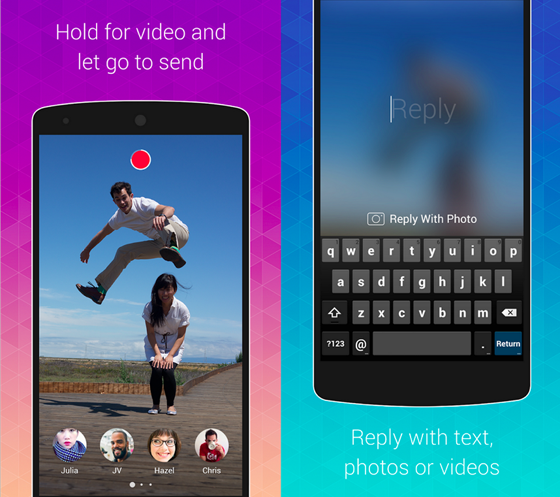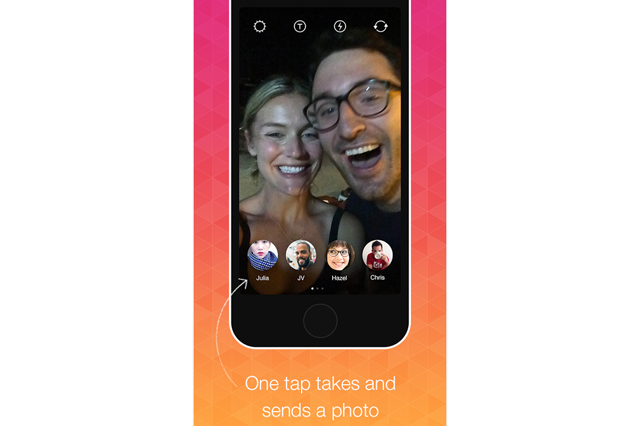Instagram has quietly unveiled its new "one-tap" messaging app, Bolt, for iOS and Android. The app lets you quickly send a photo (or video) to a friend, which then disappears once it's been read. Bolt is essentially a carbon copy of buzzy messaging app Taptalk, although a lot prettier. Tap on a friend's face to send a photo instantly, or long-press on their face to send a video. Shake your phone to undo an accidental Bolt. But there's a catch: Bolt is for now only available in New Zealand, Singapore, and South Africa.

"We're going to other regions soon, but are starting with a handful of countries to make sure we can scale the experience," an Instagram spokesman tells The Verge. "Instagram has 65 percent of its users overseas, so an international launch, while different, is actually not all that out of order with what we do." The spokesperson elaborated that the three countries were chosen for their geographical diversity, but also for their tight-knit communities, which Bolt hopes to piggyback on. Bolt, like Taptalk, only lets you send messages to one person at a time, which makes it most useful for sending quick photos or videos to a small number of people. The favorites bar at the bottom of Bolt only holds four friends, after all, though you can add up to 20, a list of which you can access with a swipe.
There's a catch: Bolt is for now only available in New Zealand, Singapore, and South Africa
Bolt's launch comes at an interesting time. Just last month, Facebook launched Slingshot, an ephemeral messaging app that lets you do many of the same things. The two apps even include an identical text editor, which lets you drop big white text on top of a photo or video. Slingshot, however, emphasizes sending photos and videos to many people at once (instead of just one), and includes a novel mechanic that makes you send a photo before you can view the one you just received. The two apps seem quite different in actual usage, but address a similar need — the private, ephemeral sharing Facebook doesn't yet encompass.

You could hypothesize that a Facebook executive asked Facebook and Instagram to start spewing out ephemeral messaging apps, but I think Bolt came from elsewhere. Instagram still operates largely as an independent company within Facebook, we're told, making its own decisions on most everything. Bolt, for example, includes no Facebook log-in. To find friends, you have to sync phone numbers from your contact list, like with Snapchat or WhatsApp. So, I think Bolt addresses a desire within Instagram to create a sharing tool that's fast and casual. Snapchat has a fraction of Instagram's user base, but its users share far more — more than half a billion snaps per day, versus 60 million Instagram posts.
Bolt aims to let you share privately, but very quickly, and only with one person at a time
Instagram proper serves a different purpose from Snapchat, but that doesn't mean Instagram doesn't want to expand what it can do. The company's Instagram Direct feature, for example, lets you send a photo privately to up to 15 people. Direct is useful to some — 45 million people use the feature every month, Instagram says — but it fits an odd niche. Direct lets you send photos privately, but slowly. Bolt aims to let you share privately, but very quickly, and only with one person at a time. The unique sharing model was pioneered by Taptalk, and was recently adopted by several other new apps including Mirage, which comes from the makers of Yo. Bolt in fact looks more like Mirage than Taptalk.
1/7
The copycat situation recalls the ill-fated Facebook Poke, a Snapchat clone that launched two years ago. But unlike with Poke, which launched as Snapchat started really gaining steam, Taptalk hasn't yet found a large audience. In New Zealand, Singapore, and South Africa, for example, Taptalk hasn't once reached the list of the top 1000 most-downloaded apps, or even broken into the top 100 in the photos or social networking categories. Poke worked better than Snapchat at the time, but failed because it faced an uphill battle converting new users. But Bolt won't have to convert many users, since so few people are using Taptalk. Bolt will only have to sell users on the new utility it provides. And unlike with past standalone Facebook apps like Paper and Slingshot, Instagram will promote Bolt at the top of every user's feed.
"Our tradition is that we look at a space and create a super simple, pretty experience to fit it."
Instagram doesn't seem to have any qualms about imitating any of the apps that inspired it. "When Instagram itself launched four years ago, we weren't the first photo filter app," said a spokesman. "Our tradition is that we look at a space and create a super simple, pretty experience to fit it."
Upon launch, Bolt will have more than just Taptalk's ire. Andrew Benton, CEO of free calling app Bolt has already penned a blog post asking Instagram to use another name for its app. Considering the precedent set by FiftyThree's letter earlier this year asking Facebook to change the name of its app Paper to something else — nothing happened — it seems unlikely that Instagram will yield to Benton's request. Instagram's Bolt, however, is notably much closer in nature to Benton's app than news app Paper was to sketching app Paper. A final note: Instagram's logo for Bolt has a lot in common with the logo of Causes, a charity organization.
It seems that before Bolt has even made its way to the States, it's already finding itself in a heap of drama. The drama ultimately won't matter, however, if Bolt is genuinely useful to millions of people. And Instagram certainly hopes it will be. "This isn't a side project," said the Instagram spokesperson. "We are totally behind this thing."
:format(webp)/cdn.vox-cdn.com/uploads/chorus_asset/file/12804795/INSTAGRAM_BOLT.0.1415206475.png)